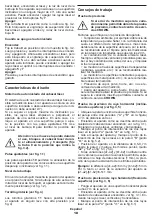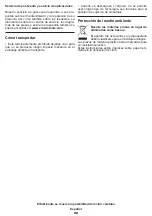
13
English
but the suspension gear of the laser head is locked�
No acoustic signals are given when the appliance is
inclined� You can switch on and off the laser beams
pressing on / off switches
5
and
7
�
Switching off:
Press and release on / off switches
6
�
Design features
Laser head self-levelling system
Laser head self-levelling system makes laser mea-
surement possible, if the appliance is put on an in-
clined or uneven surface (inclination angle not ex-
ceeding ±3°)�
If maximum possible inclination angle is exceeded, la-
ser beams start blinking; the appliance gives an acous-
tic signal� In this case put the appliance onto an even
surface or adjust the position with adjustable legs
10
�
Use bubble level
8
to facilitate the appliance position-
ing�
Attention: if the appliance is moved dur-
ing use, lock the laser head during stor-
age and transportation (set lock 9 to the
position shown in fig. 3.2).
Adjustable legs (see fig. 1.1)
Adjustable legs
10
allow for appliance position alignment
if put on an inclined or uneven surface (see fig. 1.1).
Bubble level
Bubble level
8
shows appliance position in a horizontal
plane� If the air bubble is in the middle of bubble level
8
,
the appliance is positioned correctly (see fig. 1.2).
Swivel bolt (see fig. 4)
Swivel bolts
11
make it possible to turn the appliance
with a small angle with high precision (see fig. 4).
Working advice
Precision test
If measurement error exceeds maximum
allowable variance during the precision
test, please contact CROWN service cen-
tre.
Factors, influencing appliance precision:
•
Ambient temperature, e�g�, temperature differ-
ence which may take place with distance from the
ground� Temperature difference is most consider-
able near ground surface, therefore it is recom-
mended to use the tripod for measurements in areas
with length exceeding 20 m�
•
Contamination of the laser emitter window� Al-
ways check protective windows for contaminations
before use and clean them if necessary�
•
Measurement through transparent surfaces (win-
dows, aquariums, etc�)� It is not recommended to
carry out such measurement�
•
Measurements on reflective surfaces (mirrors,
polished metal surfaces, etc�)� It is not recommend-
ed to carry out such measurement�
•
Presence of steam, dust, smoke, etc� in the air� It
is not recommended to carry out such measurement�
•
Fall of the appliance or a heavy shock� In this
case it is recommended to perform a precision test�
If maximum allowable variance is exceeded, please
contact
CROWN
service centre�
Horizontal beam precision test (surface slope) (see
fig. 3, 5)
•
Put the appliance onto an even horizontal surface
between two walls ("A" and "B" in the figure) 7 m apart
from each other�
•
Turn on the appliance as described above (laser
head self-levelling on, see fig. 3.1). Turn on horizontal
and vertical laser beams�
•
Mark the point of intersection of two laser beams on
wall "A" (point "a1" in fig. 5.1).
•
Turn the appliance body and mark the point of
intersection of two laser beams on wall "B" (point "b1"
in fig. 5.2).
•
Position the appliance in the distance of 0,5-0,7 m
from the wall and mark the same points (point "a2" and
"b2" in fig. 5.3 and 5.4).
•
If differences [а1-а2] and [b1-b2] do not differ from
each other in value exceeding the allowable variance,
specified in the technical data sheet (1 mm), the
appliance precision is within allowable limits�
Example:
the difference [а1-а2]=6 mm and
[b1-b2]=5 mm. Thus, the variance value of the appli
-
ance is [а1-а2]-[b1-b2] = 6-5 = 1 mm.
Horizontal beam precision test (surface bending)
(see fig. 3, 6)
•
Put the appliance onto an even horizontal surface
approximately 7 m apart from the wall�
•
Turn on the appliance as described above (laser
head self-levelling on, see fig. 3.1). Turn on horizontal
and vertical laser beams�
•
Mark the point of intersection of two laser beams on
wall "A" (point "c1" in fig. 6.1).
•
Turn the appliance body to the right (point "c2")
approximately 2,5 m and ensure that the horizontal
line matches point "c1" or the distance from this point
("x1") does not exceed half of the allowable variance
value (0,5 mm), specified in the technical data sheet
(see fig. 6.2).
•
Perform the same actions turning the appliance
body to the left (point "c3" and distance "x2") (see
fig. 6.3).
Vertical beam precision test (see fig. 3, 7)
•
Put the appliance onto an even horizontal surface
approximately 7 m apart from the wall�
•
Fix an approx� 2,5 m long plumb line to the wall�
•
Turn on the appliance as described above (laser
head self-levelling on, see fig. 3.1). Turn on the
vertical laser beam and focus it toward the plumb line
(see fig. 7).
•
The laser beam shall evenly illuminate the plumb
line in its whole length� If not the case, the offset ("x3")
shall not exceed the variance value (1 mm), specified
in the technical data sheet�
Summary of Contents for CT44022
Page 1: ......
Page 3: ...3...
Page 4: ...4...
Page 5: ...5...
Page 6: ...6...
Page 7: ...7...
Page 8: ...8...
Page 9: ...9...
Page 22: ...22 30...
Page 23: ...23 CT XX XXXXXXX 1 2 3 4 5 6 7 8 9 10 11 12 13 14 15 16 17 18 1 3 10 8 1...
Page 26: ...26 1 11 8 10 3 15 15 11 11 9 3 2 16 16 www crown tools com...
Page 28: ...28 30 CT XX XXXXXXX...
Page 29: ...29 1 2 3 4 5 6 7 8 9 10 11 12 13 14 15 16 17 18 1 3 10 8 1 2 13 18 13 3 2 18 18 13 3 13...
Page 32: ...32 11 9 3 2 16 16 www crown tools com...
Page 34: ...34 30 CT XXXXXXX...
Page 38: ...38 16 www crown tools com...
Page 39: ...39...
Page 40: ...40...
Page 41: ...41...
Page 42: ...42...
Page 43: ...43...
Page 44: ...44...
Page 45: ...45...
Page 46: ...46...
Page 47: ...47...
Page 48: ...48...
Page 49: ...49...
Page 50: ...50...
Page 51: ...51...
Page 52: ......


































